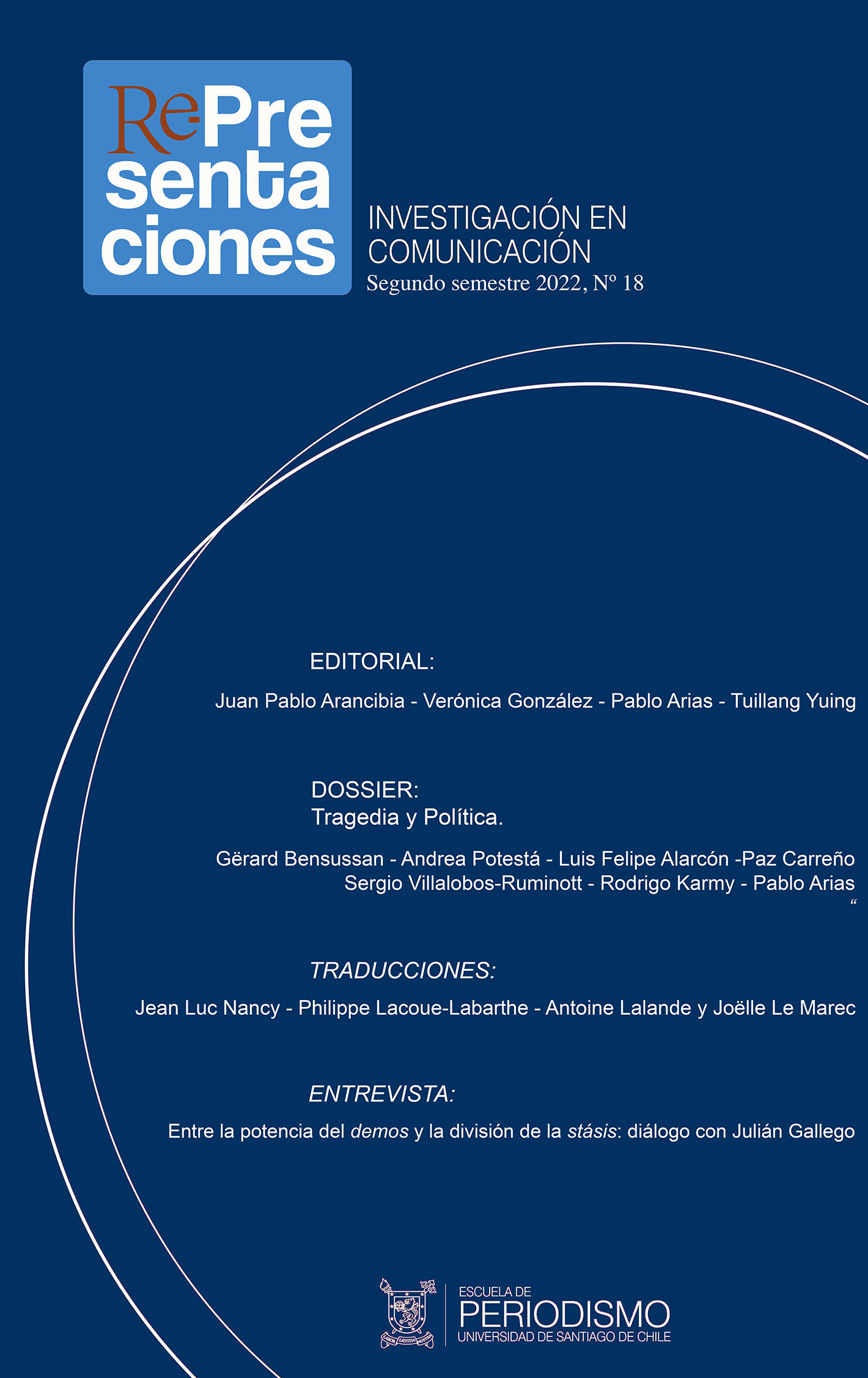The Representation or the Heart. Philippe Lacoue-Labarthe, reader of Jean-Jacques Rousseau
DOI:
https://doi.org/10.35588/rp.v0i18.5930Keywords:
Representation, Catharsis, Origin, Jean-Jacques Rousseau, Martin Heidegger, Philippe Lacoue-LabartheAbstract
This article proposes a re-reading of Philippe-Lacoue Labarthe’s critique of Martin Heidegger in Poetics of History. To do so, we underline the role played by Jean-Jacques Rousseau in the emergence of a new thought of origin, and therefore of historicity, which Heidegger takes up despite the ignorance or contempt shown towards the author of The Social Contract. Heidegger, Lacoue-Labarthe writes, could not or would not read him with due seriousness. By following the operations of displacement and translation operated by Lacoue-Labarthe, this article seeks to explore the potentialities of the Rousseaunian corpus, as well as to provide elements for a new thinking of the relationship between tragedy and politics, or catharsis and Terror, allowing to give a new impulse to the question of representation, a question that has certainly crossed the entire history of philosophy.
Downloads
References
d’Alembert, Jean Le Rond (1757). “Genève”. En D. Diderot (Ed.), L’Encyclopédie, ou Dictionnaire raisonné des sciences, des arts et des métiers, vol. VII (pp. 574–78). Paris: Briasson, David, Le Breton et Durand.
Arias, Pablo (2021). Mimesis y tiempo. Lacoue-Labarthe y los bordes de la historia (Tesis doctoral inédita). Pontificia Universidad Católica de Chile, Chile; Université de Strasbourg, Francia. Recuperada de: https://repositorio.uc.cl/xmlui/handle/11534/63104 - https://www.theses.fr/2021STRAC006
Aristóteles (1974). Poética de Aristóteles. Madrid: Gredos.
________ (1995). Física. Madrid: Gredos.
Bachofen, Blaise, y Bruno Bernard (Eds.) (2011). Rousseau, politique et esthétique. Sur la Lettre à d’Alembert. Lyon: ENS éditions.
Baczko, Bronislaw (1989). Comment sortir de la terreur. Thermidor et la Révolution. Paris: Gallimard.
Batteux, Abbé Charles (1753). Cours de Belles-lettres, ou principes de la littérature. Paris: Desaint et Saillant/Durand.
Derrida, Jacques (1967). De la Grammatologie. Paris: Éditions de Minuit.
Hegel, G. W. F. (2018). Fenomenología del espíritu. Madrid: Abada Editores.
Heidegger, Martin (1976). El origen de la obra de arte. Santiago: Ediciones Departamento de Estudios Humanísticos.
________ (2010). Los himnos de Hölderlin “Germania” y “El Rin”. Buenos Aires: Biblos.
Lacoue-Labarthe, Philippe (2002). Poétique de l’histoire. Paris: Galilée.
Marx, William (2012). Le Tombeau d’Oedipe. Pour une tragédie sans tragique. Paris: Éditions du Seuil.}
Perrin, Jean-François (2011). “Politique du poète : Rousseau et le tragique”. En B. Bachofen y B. Bernard (Eds.), Rousseau, politique et esthétique. Sur la Lettre à d’Alembert (pp. 139–61). Lyon: ENS éditions.
Rousseau, Jean-Jacques (1964). “Discours sur l’origine et les fondements de l’inégalité parmi les hommes”. En M. Raymond, B. Gagnebin, y J. Starobinski (Eds.), Œuvres complètes, tome III, Bibliothèque de la Pléiade (pp. 108–237). Paris: Gallimard.
________ (1995). “À M. d’Alembert”. En M. Raymond, B. Gagnebin, y J. Rousset (Eds.), Œuvres complètes, tome V, Bibliothèque de la Pléiade (pp. 1–125). Paris: Gallimard.
Starobinski, Jean (1971). Jean-Jacques Rousseau. La transparecen et l’obstacle. Paris: Gallimard.
Downloads
Submitted
2023-01-06Published
Issue
Section
License
Copyright (c) 2023 Felipe Alarcón

This work is licensed under a Creative Commons Attribution 4.0 International License.









